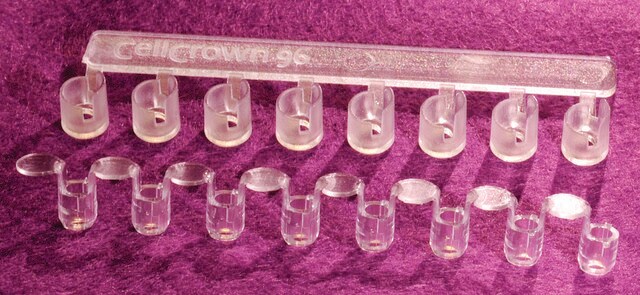Z724513
3D Biotek 3D Insert™ PCL scaffold
for 96 well plates, 24 inserts/ 96 well plate
Synonym(s):
3D, 3D Cell Culture, 3D scaffolds, Scaffolds, cell scaffolds
About This Item
Recommended Products
material
clear polycaprolactone (PCL)
clear wells
description
polycaprolactone (PCL)
sterility
sterile
quality
24 inserts/ 96 well plate
packaging
pack of 24 ea (24 inserts supplied in 96 well plate)
manufacturer/tradename
3D Biotek PCL303096-24
size
96 wells
color
clear
pore size
569 μm
65.6 % porosity (+/- 0.9)
binding type
non-treated surface
Looking for similar products? Visit Product Comparison Guide
General description
- Terminally sterilized by gamma irradiation and ready for use
- Compatible with most of your current 2D assays
- Easy for imaging. Cell growth can be monitored by light microscope, no need to purchase any additional sophisticated equipment.
1. 100% open porosity
The pores of the products are 100% open and interconnected, making it easy for cells to be seeded through out the porous scaffolds and the nutrient and cell metabolism waste to be exchanged.
2. Well defined pore size and porous structure
3D Biotek′s precision micro-fabrication technology produces well-defined porous structure and ensures the reproducibility of the porous structure from batch to batch.
3. Organic solvent free
Cytotoxic organic solvents, such as chloroform and methylene chloride, are often used in fabricating PCL scaffold. 3D Biotek′s precision micro-fabrication technology is a solvent free manufacturing process. Therefore, the PCL 3D Insert™ is free of organic solvent.
- 96 well compatible
- Fiber Diameter: 300u
- Pore Size: 300u
- 24 Inserts/Pack
Legal Information
Certificates of Analysis (COA)
Search for Certificates of Analysis (COA) by entering the products Lot/Batch Number. Lot and Batch Numbers can be found on a product’s label following the words ‘Lot’ or ‘Batch’.
Already Own This Product?
Find documentation for the products that you have recently purchased in the Document Library.
Customers Also Viewed
Articles
3D cell culture overview. Learn about 2D vs 3D cell culture, advantages of 3D cell culture, and techniques available to develop 3D cell models
Our team of scientists has experience in all areas of research including Life Science, Material Science, Chemical Synthesis, Chromatography, Analytical and many others.
Contact Technical Service








